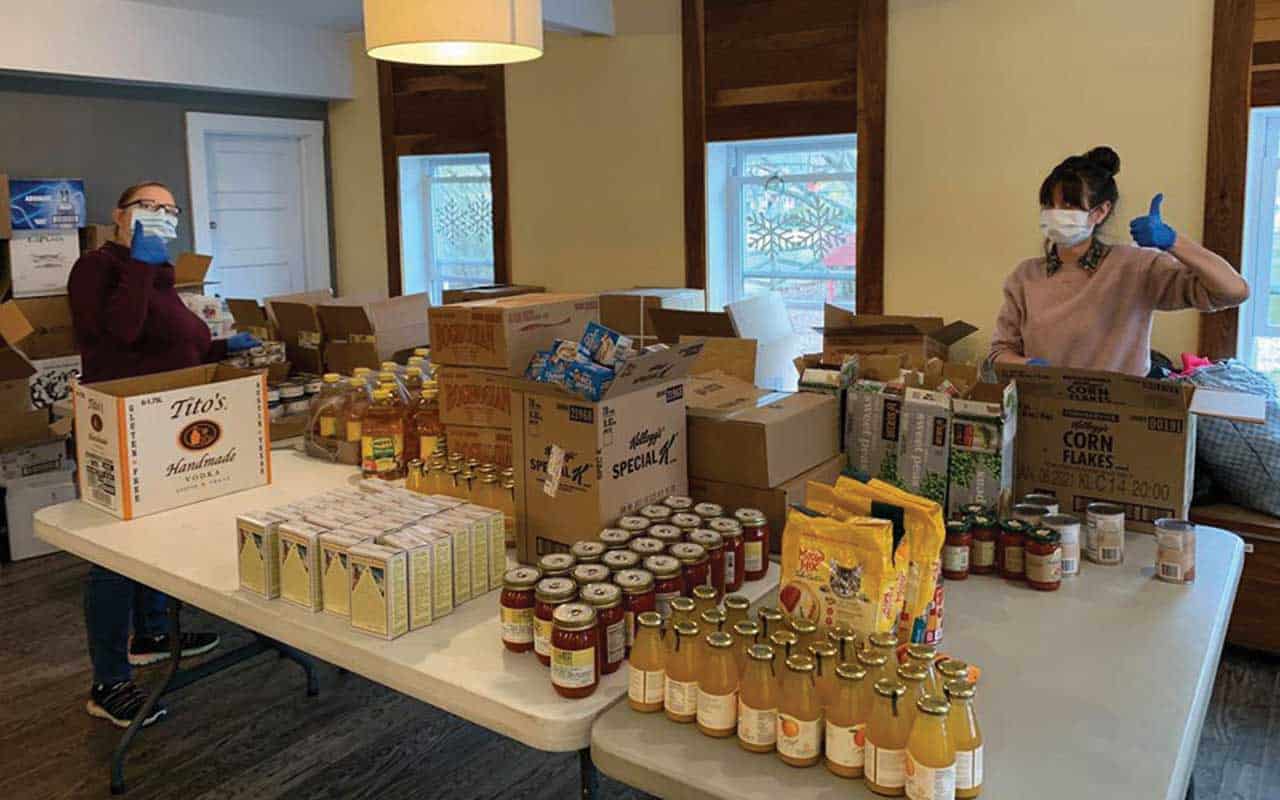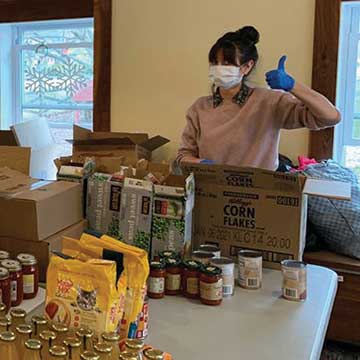This Month’s Featured Article

Trial by Fire
 Millerton, NY’s North East Community Center (NECC) has become accustomed to providing community support on a whim. Established in the winter of 1988 at the urging of Wendy Curtis and Sam Busselle, through the passing of a town statute, its original purpose was to respond to the lack of social support services for Village of Millerton and the Town of North East residents, who reside far from county services out of Poughkeepsie, NY.
Millerton, NY’s North East Community Center (NECC) has become accustomed to providing community support on a whim. Established in the winter of 1988 at the urging of Wendy Curtis and Sam Busselle, through the passing of a town statute, its original purpose was to respond to the lack of social support services for Village of Millerton and the Town of North East residents, who reside far from county services out of Poughkeepsie, NY.
As happens in many small towns around the world, events of even the most tragic nature can bring communities closer together than ever before. The spread of COVID-19 across our area has been no different, and despite massive tragedy, has proved a testament to that Golden Rule of “love thy neighbor.”
Christine Sergent, executive director of the NECC, someone who has dedicated her life to community service, recounts the organization’s eyewitness experience of this communal fusion in our area as a result of the coronavirus pandemic. By feeding the community while adapting to unparalleled challenges, what began as a trial by fire has forged an even stronger bond between the people who live, work, and survive here at home.
Since its inception, how have you seen the NECC grow and continue to cultivate relationships in order to meet the needs of the community in Millerton?
We have two amazing founders who have helped our efforts here in Millerton. Back in 1990, both Wendy Curtis and Sam Busselle were having conversations with other leaders in the community about how difficult it was for many of our local residents to access helpful services and resources. Particularly since many of the services for elder residents were in Poughkeepsie, many folks who lived here as well as other regional rural parts of the county were experiencing problems having access to critical care. So they established the early iteration of the NECC based on those fundamental concerns for senior residents.
They formed what was called the Northeast Community Council and began looking for ways to bring resources to this rural part of the county. Eventually, the NECC received a grant from the Red Cross in order to purchase a vehicle, and volunteers could take seniors to their medical appointments. That was truly our first program and the beginning of what has become a much bigger collaboration throughout our area. We still provide transportation for seniors and shut-ins today, it remains one of our larger programs and we did in fact provide that program straight through the COVID-19 crisis.
I have lived in the area for 30 years and have seen firsthand many of the effects the lack of transportation has had on our seniors. I worked for Cornell University for a very long time participating in similar kinds of community building initiatives and throughout Dutchess County as well as various regional volunteer efforts in the Hudson Valley. As an experienced collaborator and community partner, I had already experienced some of this from an outside perspective. Today, being able to work with leaders and residents of the community from within such a wonderful organization like the NECC has been a life-changing experience.
How did the NECC adapt its community outreach response when the pandemic became an immediate reality in our area?
I think that is a great way to describe our response – we became highly adaptable during this crisis. Almost immediately, we established a one client, one vehicle rule. Oftentimes, when we transport residents to medical appointments we might have two, or even three different people in our larger vehicles. Once the pandemic began to spread, this simply was no longer an option. Our drivers and their passengers wear masks and we vigorously disinfect each vehicle prior to picking up clients and after the ride is over, we are disinfecting once again. Our new function is all about being incredibly mindful of people and of their safety as well as the safety of our drivers.
We have been very lucky, of course there’s always that chance and there was a bit of discomfort in the beginning. Great communication helped, with all the clients we work with, there was not a single hitch, they didn’t raise questions, they didn’t fuss, and no one ever said “I don’t want to learn.” Surprisingly, we experienced a real slow down, or perhaps one might say a reduction in complexity. When it comes to transportation, one of our biggest funders is the Foundation for Community Health, which gave us the opportunity to flip our transportation model. Instead of picking up seniors and taking them out to get food, or to the pharmacy or medical appointments, they allowed us to use their money to transport food and supplies to seniors. This was an incredible, and critically important aspect that has allowed the NECC to continue to operate because it meant that we could really respond in a way that older residents needed when they couldn’t leave their home. Transportation being our first program, serving this community for 30 years, it became an extraordinarily important tool during this crisis.
The NECC’s fresh food pantry program has been critically important for a community whose needs have changed drastically in the last four months. How has that program expanded in particular?
There are a few foundational hallmarks that convey what the NECC has been about for decades. Two of those hallmarks are related to our youth and teen programs, and our food access program for those experiencing food insecurity. These programs have always been important mechanics and have both grown dramatically, serving our community beautifully and in very unique ways during this crisis.
Our food programs have been a part of the Community Center for quite some time, we sponsor the farmers market in Millerton which is not an income generator for the Community Center. Its function, in part, is to support our local farmers and bring people into the village to support the local businesses. We also incorporate our teens jobs programs on local farms throughout our area with a goal to educate them about where their food comes from and talk to them about the importance of locally grown nutrition.
We have never had an actual food pantry of our own. However, a few years ago we did implement something called the fresh food pantry. We received grant funding to buy fresh vegetables from local farms in order to support local agriculture and deliver them out to some food pantries. So instead of just non-perishable foods, people are able to actually get a lot of vitamins and minerals from fresh vegetables.
When we began considering community food services, we learned from our colleagues over at the Corner Food Pantry in Lakeville, CT, that 75% of their participants were from New York. As a result we convened all of the food pantries in our rural area here in Columbia County, Northeast Dutchess, and Lakeville and started having conversations about who needs pantry help and if there was a gap that the North East Community Center could fill in order to help both the pantries as well as the residents. Broadly, everyone agreed that there was definitely a need for more. We proposed the model of home delivery from local food pantries especially to shut-ins and the disabled who can’t come in to get the food. The food pantries have been incredibly helpful with supplying us with their own food for delivery.
We were working hard and just getting to the point of implementing our food pantry in March of this year when COVID-19 hit. Our resources were beginning to fall into place but were by no means adequate for something we couldn’t possibly see coming. As soon as the crisis came we started making personal phone calls to each client we had served over the last year just to let them know that we were going to be here for them in some way. Those phone calls told us the story of what this experience has been like for people out there and it rolled over the three-month period. As we listened to their unfolding stories, we heard their fears and their employment circumstances that nobody anticipated. It became a very humbling experience hearing folks call and tell us “I don’t want to take anything yet, but, I think I’m going to run out of food in the next week. Can I call you then?” It was just heartbreaking, but also very moving.
In a two-week period, in the midst of the pandemic, we successfully implemented the food pantry we weren’t even sure people needed just a year prior. The NECC has also implemented what we are calling the crisis fund and quickly began assembling contributions from a number of foundations and direct contributions. Today, in just four months, we have raised over $85,000 and all of that is going toward the food and supplies that are going back out to people of our community.
Unfortunately, this year we will not able to hold our 10th annual Chef and Farmer Brunch as a live event. Instead, we are kicking off a campaign that will include a digital roll out, a by-mail piece as well as other components. Our 4-5 week campaign leading up to July 26 will include a “thank you” stream, featuring members of the NECC as well as donors telling stories and giving thanks for everyone’s amazing communal effort. The tone of the campaign is centered around our 30-year history of helping our communities, and how the NECC has proven our commitment by serving our community in new ways throughout the COVID-19 crisis.
We have relied on incredibly wonderful people, from the Watershed Center ordering food for us at first because we didn’t have any means to do it ourselves, to LaBonne’s and the Hillsdale IGA giving us whatever they had. So many people, so many businesses trying to help us get people fed and of course it’s been almost completely run by volunteers and by rerouting some of the staff that no longer had their regular jobs to deliver food in order to keep them employed. Like so many aspects of living in this area, when crises come, people respond and through it all, our bond is as strong as ever. •
To learn more about the North East Community Center and the ways that you can either help or get help, please visit their website at www.neccmillerton.org.


